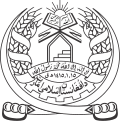This article needs additional citations for verification .(April 2022) |

 |
|---|
This is a list of diplomatic missions in Afghanistan . There are currently 17 embassies in Kabul (February 2024).
This article needs additional citations for verification .(April 2022) |

 |
|---|
This is a list of diplomatic missions in Afghanistan . There are currently 17 embassies in Kabul (February 2024).
|
Resident in Abu Dhabi, United Arab Emirates
Resident in Islamabad, Pakistan
Resident in Kuwait City, Kuwait
Resident Elsewhere
| Host city | Sending country | Mission | Year closed | Ref. |
|---|---|---|---|---|
| Kabul | Embassy | 2021 | [27] | |
| Embassy [a] | 2015 | [28] | ||
| Embassy [b] | 2018 | [29] | ||
| Embassy | 2021 | [30] | ||
| Embassy [c] | 2001 | [31] [32] | ||
| Embassy | 2021 | [33] | ||
| Embassy | [34] | |||
| Embassy | [35] | |||
| Embassy | [36] | |||
| Embassy | [37] | |||
| Embassy | [38] | |||
| Embassy [b] | 2015 | [39] | ||
| Embassy | 2017 | [40] | ||
| Embassy [d] | 2021 | [41] | ||
| Embassy [a] | 2009 | |||
| Embassy [d] | 2021 | [42] | ||
| Embassy [e] | 2014 | [43] | ||
| Embassy | 2021 | [34] | ||
| Embassy [b] | 2013 | [44] | ||
| Embassy [a] | 2021 | [45] | ||
| Embassy [d] | [46] | |||
| Embassy | [47] | |||
| Embassy | [48] | |||
| Embassy [d] | [49] | |||
| Embassy [f] [g] | [50] [51] | |||
| Embassy [a] | 1992 | [52] | ||
| Kandahar | Consulate [h] | 2001 | [32] |